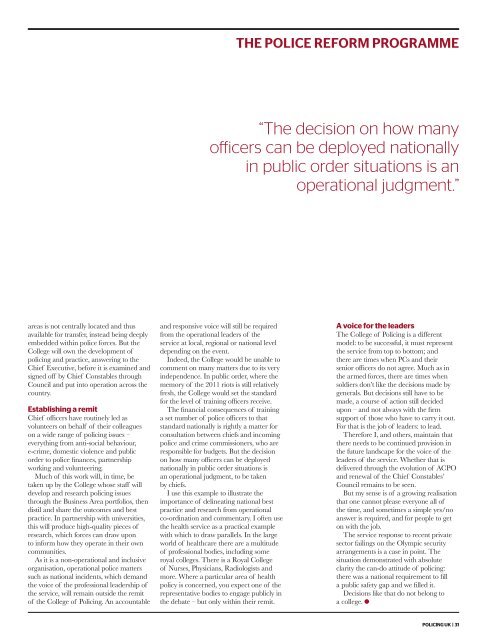Policing UK 2013 - Police Federation
Policing UK 2013 - Police Federation
Policing UK 2013 - Police Federation
You also want an ePaper? Increase the reach of your titles
YUMPU automatically turns print PDFs into web optimized ePapers that Google loves.
THE POLICE REFORM PROGRAMME<br />
“The decision on how many<br />
officers can be deployed nationally<br />
in public order situations is an<br />
operational judgment.”<br />
areas is not centrally located and thus<br />
available for transfer, instead being deeply<br />
embedded within police forces. But the<br />
College will own the development of<br />
policing and practice, answering to the<br />
Chief Executive, before it is examined and<br />
signed off by Chief Constables through<br />
Council and put into operation across the<br />
country.<br />
Establishing a remit<br />
Chief officers have routinely led as<br />
volunteers on behalf of their colleagues<br />
on a wide range of policing issues –<br />
everything from anti-social behaviour,<br />
e-crime, domestic violence and public<br />
order to police finances, partnership<br />
working and volunteering.<br />
Much of this work will, in time, be<br />
taken up by the College whose staff will<br />
develop and research policing issues<br />
through the Business Area portfolios, then<br />
distil and share the outcomes and best<br />
practice. In partnership with universities,<br />
this will produce high-quality pieces of<br />
research, which forces can draw upon<br />
to inform how they operate in their own<br />
communities.<br />
As it is a non-operational and inclusive<br />
organisation, operational police matters<br />
such as national incidents, which demand<br />
the voice of the professional leadership of<br />
the service, will remain outside the remit<br />
of the College of <strong>Policing</strong>. An accountable<br />
and responsive voice will still be required<br />
from the operational leaders of the<br />
service at local, regional or national level<br />
depending on the event.<br />
Indeed, the College would be unable to<br />
comment on many matters due to its very<br />
independence. In public order, where the<br />
memory of the 2011 riots is still relatively<br />
fresh, the College would set the standard<br />
for the level of training officers receive.<br />
The financial consequences of training<br />
a set number of police officers to that<br />
standard nationally is rightly a matter for<br />
consultation between chiefs and incoming<br />
police and crime commissioners, who are<br />
responsible for budgets. But the decision<br />
on how many officers can be deployed<br />
nationally in public order situations is<br />
an operational judgment, to be taken<br />
by chiefs.<br />
I use this example to illustrate the<br />
importance of delineating national best<br />
practice and research from operational<br />
co-ordination and commentary. I often use<br />
the health service as a practical example<br />
with which to draw parallels. In the large<br />
world of healthcare there are a multitude<br />
of professional bodies, including some<br />
royal colleges. There is a Royal College<br />
of Nurses, Physicians, Radiologists and<br />
more. Where a particular area of health<br />
policy is concerned, you expect one of the<br />
representative bodies to engage publicly in<br />
the debate – but only within their remit.<br />
A voice for the leaders<br />
The College of <strong>Policing</strong> is a different<br />
model: to be successful, it must represent<br />
the service from top to bottom; and<br />
there are times when PCs and their<br />
senior officers do not agree. Much as in<br />
the armed forces, there are times when<br />
soldiers don’t like the decisions made by<br />
generals. But decisions still have to be<br />
made, a course of action still decided<br />
upon – and not always with the firm<br />
support of those who have to carry it out.<br />
For that is the job of leaders: to lead.<br />
Therefore I, and others, maintain that<br />
there needs to be continued provision in<br />
the future landscape for the voice of the<br />
leaders of the service. Whether that is<br />
delivered through the evolution of ACPO<br />
and renewal of the Chief Constables’<br />
Council remains to be seen.<br />
But my sense is of a growing realisation<br />
that one cannot please everyone all of<br />
the time, and sometimes a simple yes/no<br />
answer is required, and for people to get<br />
on with the job.<br />
The service response to recent private<br />
sector failings on the Olympic security<br />
arrangements is a case in point. The<br />
situation demonstrated with absolute<br />
clarity the can-do attitude of policing:<br />
there was a national requirement to fill<br />
a public safety gap and we filled it.<br />
Decisions like that do not belong to<br />
a college.<br />
POLICING <strong>UK</strong> | 31
















